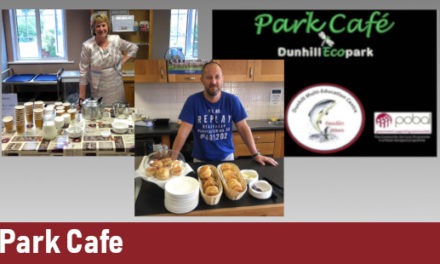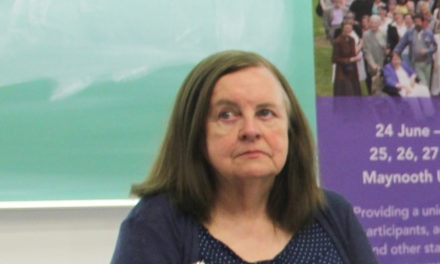Pat Spillane may have genuine and valid concerns with how the Department of Rural and Community Development operates, but his Late Late Show appearance was far from balanced.
Kerry football legend and sports pundit Pat Spillane appeared on RTÉ’s Late Late Show recently to talk about rural Ireland. He was critical of work by the Department of Rural and Community Development, in particular of a nationwide weekend-long initiative called the Big Hello (held over the long weekend in May). He implied it was a waste of money when rural communities are facing big challenges.
Editor Allen Meagher was among the 650,000 viewers (the Late Late’s weekly average) who watched the show.
The Department of Rural and Community Development has a budget of close to €300m this year. While it is sadly the lowest of all departments’, it’s still up 27% on last year.
Yet, an irate Pat Spillane – appearing on RTÉ’s Late Late Show on April 19th – focused venom on a minor initiative (costing €0.3m) that was being tried for the first time by the Department.
The Big Hello’s aim was to bring communities together over a weekend, nationwide. It never promised to cure poverty and inequality, tackle climate change or topple the elite. It simply sought to encourage people in urban and rural areas to get together at community level.
“Motherhood and apple pie… gobbledegook,” Spillane called it, and worse.
To hear him mouth off about it – he was funny at times – you’d think the Big Hello was the be-all and end-all of what the Department does. The Big Hello will cost the Department just 0.1% of its budget by year’s end. (Further funding to communities also comes from other departments).
For a national event with a potential reach into thousands of communities, spending €0.3m was surely worth a try. (Over 800 events were held nationwide as part of the initiative, the Department reported).
Lessons will be learned to make the Big Hello even better if held again next year. Responses already coming into Changing Ireland from community development workers suggest that:
– As it partly aims to tackle isolation, holding the event either in October or November (when the suicide rate rises) might be better.
– Perhaps it should be held on an ordinary weekend, as many people already have plans for long weekends.
– Communities shouldn’t be confined to holding it on one specific weekend.
The sector isn’t without problems
Leaving aside his personal grievances, Spillane made fair points on a wider level about rural Ireland’s absolute need to offer more employment and to retain shops, post offices and so on.
“If you want to tackle isolation and tackle loneliness and invigorate communities, well, make an effort to keep the shop open, make an effort not to close the post office and to keep the doctor’s surgery open.”
He said he was very passionate about rural Ireland. “And if I am angry about it, I make no apologies about it.”
He said that “grants are great, but grants are short-term, sticking-plaster solutions.”
Reaction on social media suggests that Spillane, while not saying anything new, expressed the dismay many people in rural Ireland feel.
He said, “If I was being a cynic… Say a big hello to the shopkeeper before he closes his door for good. Say a big hello to the postmaster before the post office closes…”
Rural Ireland needs help
He exaggerated, but it worked to get the points across. Yes, we have Garda checkpoints galore, but fewer Garda stations to call to when in need.
We have poor or no broadband – which he didn’t mention – in many rural areas.
Hundreds of shops are gone from towns and villages. The Department will of course point to the growing success of its Town and Village Renewal Scheme (€53m spent to date supporting 675 projects). Yet, the number of community shops in Ireland, highlighted in our previous edition, stands at less than 10.
Of 159 appeals to An Post not to shut post offices, only four were successful. To be fair, that is outside the Department’s brief and the Government shoulders collective responsibility for their demise. Or is EU competition law to blame? Either way, communities have lost out.
It’s not all bad news
On the other hand, I heard no mention on the Late Late about libraries expanding to become community hubs, or of the gratitude from community groups for the grant schemes dismissed by Spillane as ‘sticking plasters’. Nothing about the rollout of LEADER funding.
Elections are coming and Spillane claimed that’s why he was speaking out; that election-time was the best time to highlight issues facing rural Ireland.
He made some good points, but passed up on the opportunity to say something inspiring on a premier show. He had the stage to himself (bar Tubridy).
“Why can’t we bring jobs to rural Ireland?” he asked, but we didn’t hear about the thousands of jobs created over the last decade (in both rural and urban areas) through community programmes supported by the Department. We didn’t hear about social enterprise coming into its own, or of initiatives to support people with disabilities and combat isolation.
He said there were some “really good projects,” but didn’t tell us about any of them. Meanwhile, away from the TV screens, community groups are becoming their own ambassadors. They’ve developed their own voice – where the structures are working (in most counties) – through Public Participation Networks.
Local projects are becoming storytelling ambassadors to highlight what’s working for individuals and in communities. They are being actively encouraged to do this.
Almost all the targets set under the Social Inclusion and Community Activation Programme (SICAP) have been surpassed and we’re now starting to hear from the people previously represented in those statistics.
Oxfam researchers have proven that the general public cannot easily relate to big figures, but when combined with an individual’s story it can have an impact. The two together are more likely to benefit society by influencing policy makers.
This is the way to go. It’s not one or two voices shouting loudly that impresses; it’s many speaking as one, or similarly.
Furthermore, empowering people to engage in collective action and speak up is important in community development. The Department under Minister Ring is to be applauded for recognising this. (For his part, Minister for Rural and Community Development Michael Ring TD has said he would have liked to join the discussion, and criticised RTÉ for its lack of balance.)
So, let’s see more support for community development workers to plug into what their communities are saying, to support workers to network at county level, to collaborate and speak out nationally. If they employ humor, show passion and claim to have been wronged, Tubridy might even have a big hello for them on stage!
Disclosure: Changing Ireland magazine – based in Moyross, Limerick, and managed by a voluntary board – is independent. We receive core-funding from the Department mentioned in this article, but do not shy away from expressing healthy criticism or allowing other writers to do so.
Our journalism is focused on communities, on community development and on social inclusion.
Interested in reading more about the state of Ireland’s community development sector? Check out our latest issue.





